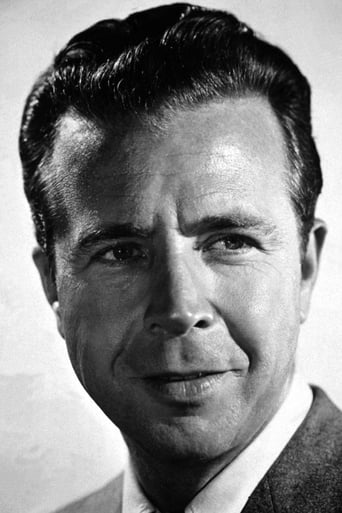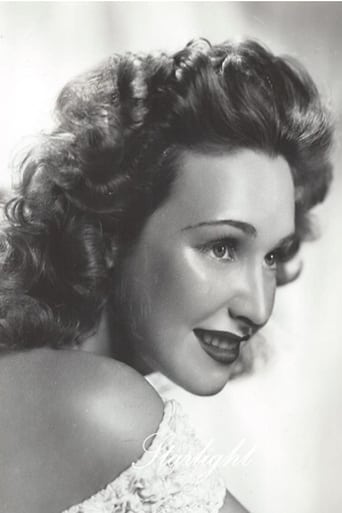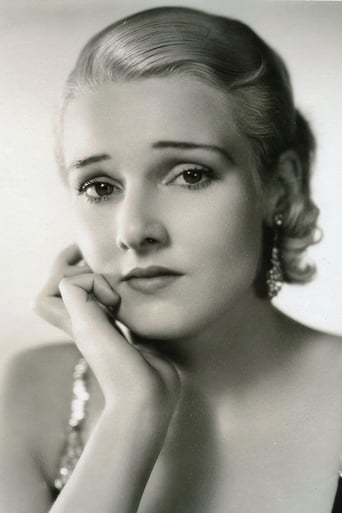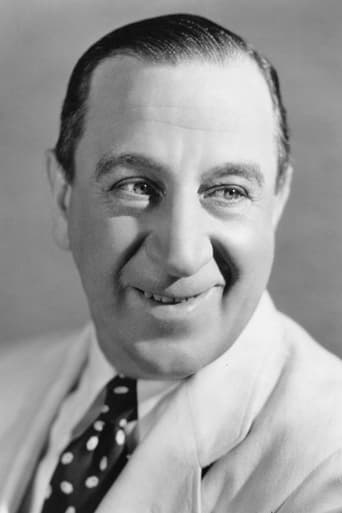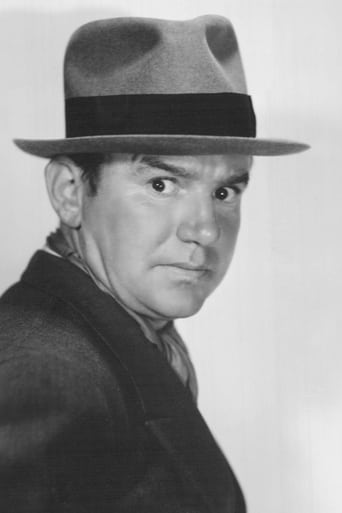Contentar
Best movie of this year hands down!
Brainsbell
The story-telling is good with flashbacks.The film is both funny and heartbreaking. You smile in a scene and get a soulcrushing revelation in the next.
filippaberry84
I think this is a new genre that they're all sort of working their way through it and haven't got all the kinks worked out yet but it's a genre that works for me.
Kimball
Exactly the movie you think it is, but not the movie you want it to be.
weezeralfalfa
A Warner musicomedy directed by Busby Berkeley. Unlike the usual Warner film choreographed by Busby, there's no stage dancing or military maneuvers. Instead, it's lots of singing, the majority concentrated at the end, as is typical of Busby's choreography when there is considerable stage dancing and military maneuvering. Unfortunately, only a little of the terminal music was of interest to me. Most of the best musical numbers occurred before this: "Hooray for Hollywood" at the beginning and again at the end, "Silhouette in the Moonlight", also sung twice and, my favorite: "I'm Like a Fish Out of Water". We have a variety of featured singers, such as Dick Powell, Rosemary Lane, Johnnie Davis, Francis Langford, and Terry Cooper. New songs were composed by the team of Richard Whiting and Johnny Mercer. Music by Benny Goodman or Raymond Paige Orchestras or the multiracial Benny Goodman quartet(Benny, Teddy Wilson, Gene Kruppa, and Lionel Hampton).The screen play is decent, with a variety of character actors, as well as Dick Powell , contributing to the humor. The plot is mainly concerned with the impersonation of spoiled Hollywood diva Mona(Lola Lane) by a look-alike waitress in the hotel: Virginia(Rosemary Lane). Seems Mona had a temper tantrum about a casting decision, and refused to go to the premier showing of her latest picture. To avoid embarrassment, her producer ordered that a look-alike be found to take her place, squired by new recruit Ronnie(Dick Powell). This proved fortuitous, as Virginia and Ronnie, both singers, soon fell in love. There is no love-hate oscillations in this relationship, as in many musicals. However, Ronnie is confused for a while when he greets Virginia, a waitress, presumably as as Mona, then the real Mona, leading a retinue of dogs and dog walkers, shows up in the hotel. Ronnie gets slapped twice for acting fresh with the real Mona, before he finally learns the truth, and decides he likes Virginia, the waitress, much better. Ronnie is soon involved with another impersonation, when he is asked to dub the singing of Mona's costar for her new movie. This he does, but when the studio wants him to dub the costar's voice at a radio show, he balks. His friends arrange to take the costar elsewhere during the broadcast, so that Ronnie can show his face as the real singer. Hugh Herbert who played Mona's goofy father, and Mabel Todd, as Mona's goofy sister, tried to be funny in their usual ways, but usually fell flat for me.Currently available as part of the Busby Berkeley DVD Collection
idcdr
It's a little naive to have to mention that the black face scene with Hugh Herbert was racist. Trying to shame history is futile and silly at best. We can learn from our past but not change it. It's like still blaming the South for slavery which hasn't existed since the 1800s. The movies at the time reflected the social mores of our society and nothing more. They were never meant to be guidelines for the future. I, personally, am a big Jolson fan and anyone knows who has read his biographies that he was far from a racist and aided many black performers in furthering their careers. Black face was a performing art for its time and was even performed by many famous black performers including the great Bert Williams. The Hollywood Hotel is a very charming movie and well worth watching. It is loaded with great stars and especially those adorable Lane sisters. I hope that someday that critics of vintage movies will leave out their comments about the shame of a black face appearance as if it has anything to do with our current issues.
DLewis
A sprawling, huge, hot mess of a musical from Busby Berkeley and the last of his cycle of features for Warners; not to mention the only one that doesn't contain any dedicated dance routines. Dick Powell is the center of attention, playing a small town saxophonist with the Benny Goodman Orchestra (?) who heads off to Hollywood to work a short stint at a movie studio he has won in a contest, only to take the fall for a stunt involving a stand in for a major star who discovers the ruse and has them both fired. He does fall for the girl, and he doesn't lose her this time, but simply makes himself scarce at points. Along the way we hear some fine, and not so fine, Johnny Mercer and Richard Whiting penned production numbers, and Benny Goodman does make it back into the picture somehow, though that is not explained, and he and his fabulous 1937 orchestra and quartet provide the film with its finest moments. And just in time, as by February of 1938 the orchestra as it is here was basically disbanded.One wants to draw comparisons with "A Star is Born," released by the Selznick studio in April of 1937, and this may have been intended as an upbeat answer to the very downbeat Selznick picture. It opens with a rousing, energy filled sequence with Powell, Goodman, Frances Langford and Johnny "Scat" Davis introducing the song "Hooray for Hollywood" which has since become a theme song for Tinseltown of sorts, even if the movie it came from isn't particularly well remembered. There is a nice and useful montage of the facades of some of the most famous Hollywood restaurants, all demolished now. Then this leads into a very, very long second chapter, setting up the premise, and this part of the film seems to take forever; it is quite some time before we make it to another song. While there are no dance routines, there are large scale co-ordinations of action, particularly in a complex sequence in Callahan's Drive In involving carhops, Powell, Ted Healy, Edgar Kennedy, a studio executive, customers and crashing dishes. It's emblematic of the whole film; Berkeley has all of these balls up in the air -- the Benny Goodman and (over the top) Raymond Paige Orchestra, Powell, duplicitous studio executives, Lola Lane as a snooty, self-absorbed star and real life sister Rosemary Lane playing her double, the antics of Hugh Herbert, a parody of "Uncle Tom's Cabin" (or "Gone with the Wind," or both) as part of a film within a film, a radio show with Louella Parsons (who is not at all comfortable on screen), celebrity radio hosts, songs etc. But these elements don't really shake hands; things happen because they happen. We see Frances Langford, dewy-eyed, singing Dick Powell away to the train station at the start and later she returns to sing on the radio program that Dick Powell makes his way onto, but we don't know why or how she got there. "Hollywood Hotel" throws all manner of things at us to impress us, but ultimately it's Benny Goodman and "Hooray for Hollywood" that stays with you; as a film, and story, nothing seems to stick together very well here.There is some dated, and unfortunate, racial humor of the kind that doesn't travel well with post-modern audiences, but mercifully such scenes are brief. And, in a sense, being able to see Lionel Hampton and Teddy Wilson as the stars and expert musicians they are in Goodman's quartet makes up for that, though this sequence was placed as it is deliberately so that it could be lifted out of the film when it played the South. It seems that with any 1930s film that Warner Bros. sensed was in trouble they'd find a way to drop Hugh Herbert into the mix; a mixed blessing. Here, he is abysmal. I do not object as much to Mabel Todd's character as some of the other commentators here, but I agree that she is not the film's strongest asset. Powell soldiers on through his typically wide-eyed boy character from earlier Berkeley musicals, but here you get the sense he is running out of patience with the role and is playing him as a stock. Both Healy and Alan Mowbray are funny; though this was not Healy's last picture, it was the last to open in his lifetime -- he died the day after its Hollywood premiere. There is an amusing subtext about the vagaries of dubbing pictures, and several nice shots of Hollywood landmarks of the past. One may argue that there is not enough of Glenda Farrell, and at least one musical number was cut from the picture, but more is not necessarily what one wants from this film; even at a minute short of two hours, it feels really long. "Hollywood Hotel" is worth seeing for Goodman, and some of the songs; otherwise, this one must have given Busby Berkeley no end of headaches. With all that's going in "42ND Street," every action and every character links together. It just doesn't happen in "Hollywood Hotel;" the rooms are over-booked.
dougdoepke
Too bad the high-point comes so early. It's a rousing performance of that zippy tune "Hooray for Hollywood" with Benny Goodman's marching band comin' at ya. The remaining 100 minutes is best taken as a spoof on Hollywood's over-sized ego's and cut-throat film industry, which would work fine except too many of the scenes go on too long, way past the point of diminishing returns. Do we really need 12 minutes of Lola Lane acting the pampered, self-centered movie goddess. But then I gather she was dating the movie's producer, Hal Wallis. Then too, poor Dick Powell gets one of his sappier roles, all wide-eyed grin and much too foolish for even a spoof like this.The best moments are Goodman's numbers which are nevertheless too few to compensate. They do, however, include a good look at vibraphonist Lional Hampton and premier drummer Gene Krupa, along with a quick peek at jazz trumpeter Harry James. On the other hand, the Raymond Paige version of "Dark Eyes" amounts to a textbook example of gaudy over-orchestration. Still, it gives legendary director Busby Berkeley a chance to swoop his camera around in trademark fashion. The drive-in musical bash is both well staged and unusual, with a few clever touches (the falsetto-voiced thug), but again goes on too long. And of course Berkeley does keep everybody in motion, so if some of the routines get wearisome, at least they never drag. But then he's got to work in a lot of second-rate comedy acts (Herbert, Todd), most of which may raise a chuckle but not much else.No, in my book, it's a disappointing movie, both patchy and undistinguished, except for the knock-out title tune and a winsome Rosemary Lane. Then again, what other film of the day provided a role for movieland's queen of gossip, Louella Parsons, with a cheerless smile that never seems to fade. Somehow, that seems fitting.

